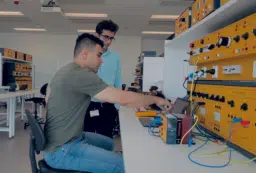“Busting the ‘gut’ puzzle”
Ever wondered why you don’t spew more often? Your intestine, controlled by its own “brain”, the Enteric Nervous System, silently, without your conscious knowledge, performs this miraculous feat, controlling food movement and digestion, every day of your life.
Researchers have combined medical and engineering techniques to develop a ‘virtual’ human gut with its associated nerve pathways so that medical researchers can better understand the how the digestive tract works and the causes of gut disorders.
Ms Sherry Randhawa, a Biomedical Engineer from Flinders University in South Australia announced the results of her research today (6 May) at the ScienceNOW conference in Melbourne.
“The computer model we have developed of the gut will make it possible for medical researchers to quickly see the results of any treatment options for various gut disorders,” she says.
“This means more effective treatments for those stomach and bowel problems that currently affect twenty-five percent of the population. And most people suffer from gut problems at some time in their lives.”
Ms Randhawa says the gut has its own complicated nervous system whose intricacies Flinders Medical Centre (FMC) scientists have been studying over the past decade.
“I took data that had been compiled by FMC researchers on how nerves work, and in particular; how nerves are physically positioned along the intestine,” she says. “This includes finding out how the nerves sense the condition of the intestine, how they connect with each other and how they interact with muscle.
Using my engineering skills, I fed this information into a software environment that could produce a visual simulation of how the gut works.
“We’ve already used the model to show that projections of nerve cells cause the wave like movement in the gut which moves food through the digestive tract. This is backed up by experiments on real intestines.”
Ms Randhawa says this model is a kind of feedback mechanism that allows researchers to input conditions that simulate real-life problems and in the end allow them to see whether or not they’re on the right track. They can then formulate ways to solve these problems.”
Ms Randhawa also believes the human gut is a highly under-rated and under-valued system.
“If the digestive tract is not doing its job properly, then you get such superficial symptoms as dry wrinkly skin and limp hair. These point to more serious underlying problems such as ulcers, diarrhoea, constipation and other nasties, some of which can ultimately result in death,” she says.
“The model is particularly important because until now very little research has been done on the gut’s nervous system and not much is known about it.
“For the first time we can actually ‘see’ how the intestine works, and how it reacts to adverse conditions. We believe this will lead to significant breakthroughs in the treatment of disorders of the digestive system.”
“Perhaps the GPs of the future will have computers with virtual bodies on them so they can diagnose and treat patients on screen before writing prescriptions.”





 Fresh Science is on hold for 2022. We will be back in 2023.
Fresh Science is on hold for 2022. We will be back in 2023.